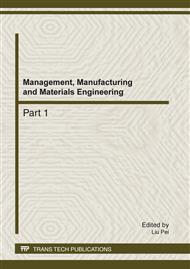[1]
Zan Xinmin, Liu Shanmin. Empirical study on the difference of managerial compensation structure In Chinese listed firms[J]. The Journal of Economics Research, 2003, (8), pp.55-63. (In Chinese)
Google Scholar
[2]
Yin Changsen. Study on the relationship between managerial incentive compensation and firm performance of Chinese listed firms[J]. Management Science, 2004,(1), pp.125-132. (In Chinese)
Google Scholar
[3]
Hao Ying, Liu Xing, Lin Chaonan. An Empirical Research on the General Manager Overconf idence and Investment Decision for the Listed Companies[J]. Journal of Management Sciences in China, 2005,(5), pp.142-148. (In Chinese)
Google Scholar
[4]
Wang P., Tian Y., Li Y. Empirical study on the issue of executives compensation In Chinese listed firms[J]. Management Science, 2006, (3): 59-65. (In Chinese)
Google Scholar
[5]
Barkema Harry and Johannes Pennings. Top Management Pay: Impact of Overt andCovert Power [J]. Organization Studies , 1998, (19), pp.975-1003.
DOI: 10.1177/017084069801900604
Google Scholar
[6]
Garry L. Adams. Power Plays: A Longitudinal Examination of CEO/BOD Power Circulation and its Impact on Organizational Performance [D]. The Florida State University college of Business, Doctoral Dissertation , 2004.
Google Scholar
[7]
Donghui Li, Fariborz Moshirian, Pascal Nguyenand Liwen Tan. Corporate governance or globalization: What determines CEO compensation in China?[J]. Research in International Business and Finance. 2007,01, pp.32-49.
DOI: 10.1016/j.ribaf.2005.12.003
Google Scholar
[8]
Phillip Leslie, Paul Oyer. Managerial incentives and value creation: evidence from private equity[Z]. Stanford University Working paper, October, 2008, 1-41.
DOI: 10.3386/w14331
Google Scholar
[9]
Jensen, M.C., Murphy, K.J. Performance Pay and Top-Management Incentives[J]. Journal of Political Economy, 1990, 98(2), pp.225-264.
DOI: 10.1086/261677
Google Scholar
[10]
Zhang Changzheng, Li HuaiZu. Manipulation effect of managerial discretion on CEO pay: Evidence from Listed Firms of China[C]. 6th International Conference on Management, Wuhan, China, 2007, pp.1093-1102.
Google Scholar


